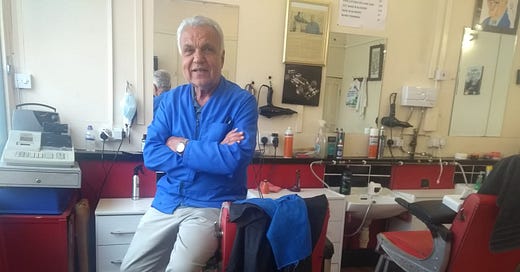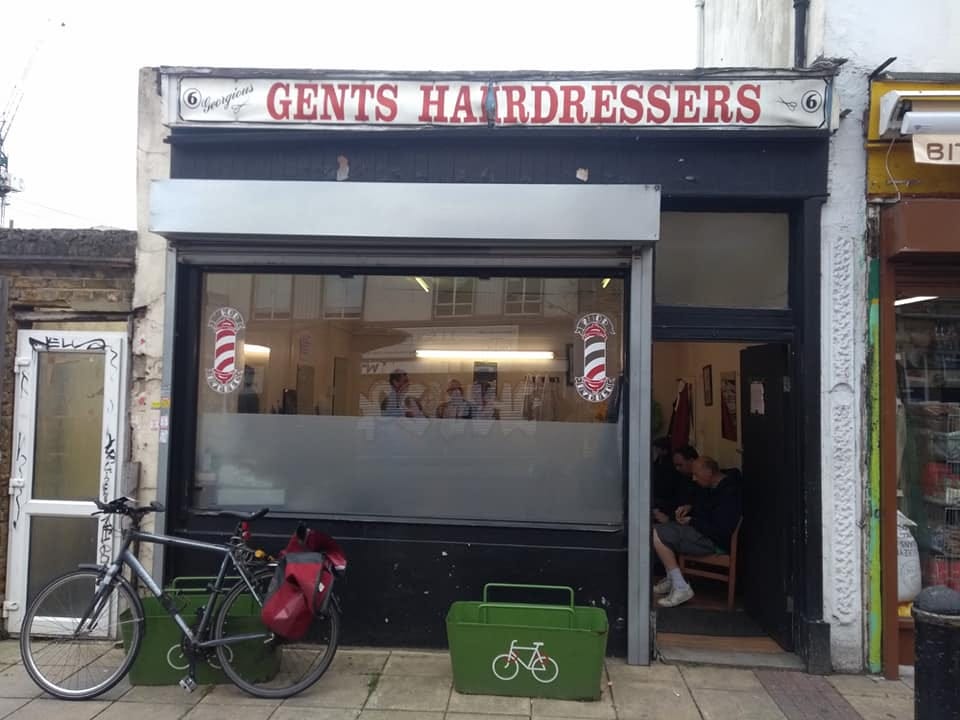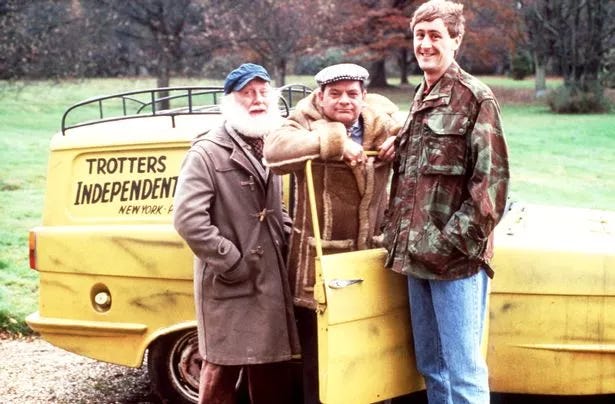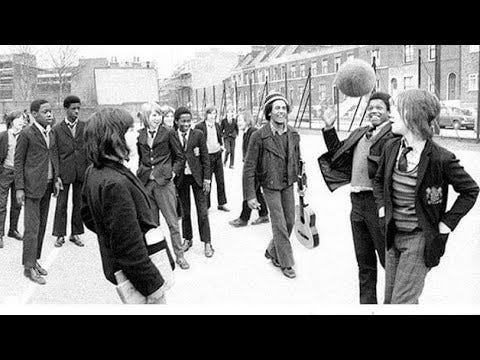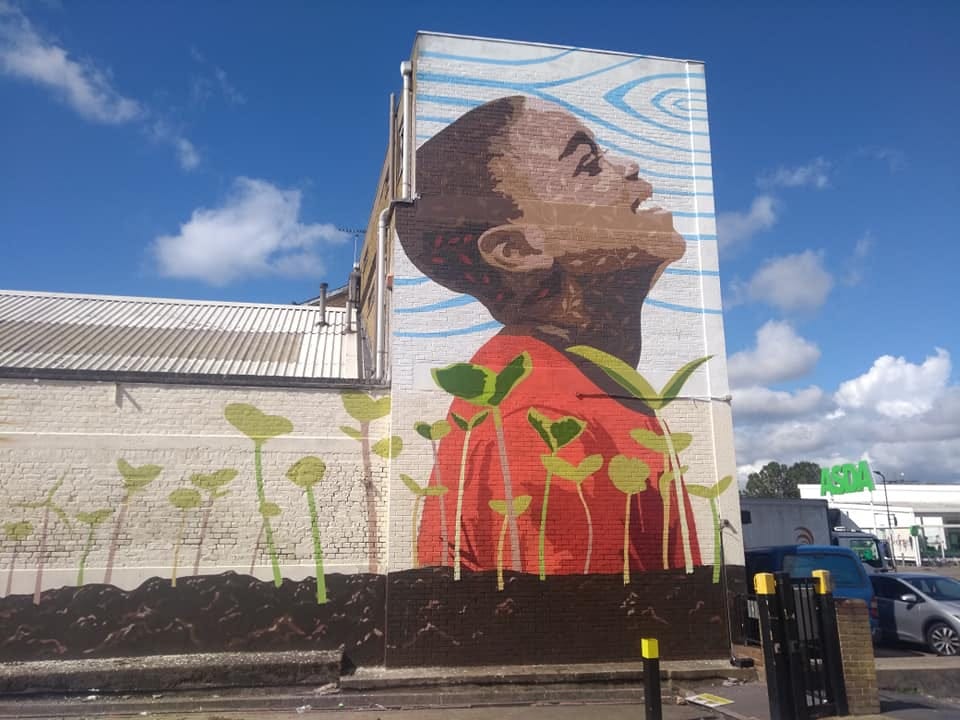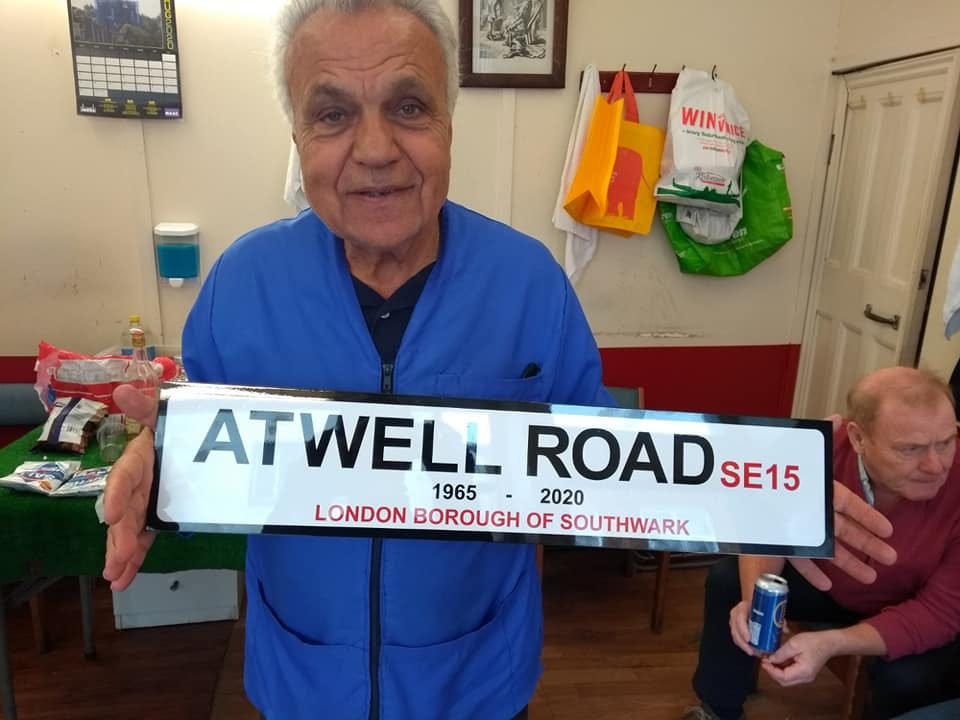Portrait of the barber as an older man: Sotiris Andreou at his work station.
On Saturday morning, jet lagged to hell, I headed up to East Street Market to get much needed fruit, veg’ etc. As I approached the nuts/dried fruit stall its owner, Ray Peanuts, leant forward and said quietly, “this is my final day. I’m retiring.”
I was surprised – Ray’s an institution, the longest standing trader on East Street, and before him his parents ran the stall. And before them, his nan (“from Naples”) sold roasted chestnuts. Ray’s worked here since he was 14. I asked his age. “69.” Time then to put his feet up. I will miss him as he sold excellent produce at very reasonable prices. And always had interesting thoughts/observations – even if I didn’t always agree with him.
“55 years working on East Street,” I said. He nodded and said “around about that.” I then recalled how Andrew, the Peckham barber I used to go to, retired in late 2020 after cutting hair in the same Peckham barber’s shop for 55 years. As he gave a good deal of notice that he was retiring, I had time to interview him. Ray was busy – Saturday is the busy day on East Street – but I got his phone number; perhaps one day I’ll chase him up for a lowdown on being a market trader for more than half a century (how many people can you think of work in one physical space for 50+ years? Even though Ray and Andrew were self-employed they created jobs for life for themselves).
Anyway, this reminded me to look up the feature I wrote on Andrew. 2020 was when Covid raged and, as the UK news this week is full of reports on the half decade anniversary of the first British lockdown, I decided to contribute a memory.
This feature originally appeared in a Romanian online publication, then was translated into Italian. Why? Because, I guess, ordinary people and the communities they live in don’t get a lot of serious attention in a world saturated by shouting and celebrity. I’m proud of this piece and hope you also enjoy it.
* * *
On Saturday afternoon, August 29, I settled into my local barber’s chair and requested a “number one” from Andrew, the gracious Cypriot who runs Gents Hairdressers in Peckham, south east London. This routine here is one I’ve engaged in many times over the last decade but, on a blustery August afternoon, it took on a special significance: today was the very last day this small shop would trade as a barbers.
There’s a sadness in knowing a local institution is about to close, but no shock – when, post-lockdown, I dropped in for a seriously needed haircut, Andrew was sitting outside in the sunshine. I had never, ever seen him doing so before – normally, you took a seat and waited for your turn. He explained how business was extremely quiet. Indeed, quieter than ever before. While the news was full of reports on UK hairdressers being booked up weeks ahead and chic barber shops turning away customers, Andrew was finding his regulars not yet ready to venture outside.
The reason for this is perhaps best answered by Andrew’s age: 74. He is both old and old school: his barber shop is tucked away on pedestrianised Atwell Road off Rye Lane (Peckham’s main shopping boulevard) and, essentially, is unchanged from when he first started work here 55 years ago: cash only, nothing fancy available (a “beard trim” is on offer but forget “Turkish razor cuts” or “waxing”, “facials” or such), no music plays (let alone TV), reading matter for customers while they wait remains a tabloid newspaper, the walls are unadorned, beyond a few framed cuttings honouring Gents Hairdressers + a message of thanks from Andy McNab, the former British soldier turned bestselling author of Bravo Two Zero and a Peckham lad. Thus Andrew’s customers were largely local men of his generation and Covid-19 has likely made many fearful of venturing out.
During my post-lockdown cut Andrew and I chatted on our experiences over the past three months: he had stayed at home, looking after his disabled wife and tending his garden, this being the longest break from work he had ever experienced in his adult life. His daughter and grandchildren live in Cyprus, but the island’s strict lockdown has ensured that travel there is not feasible right now.
He got out his phone and showed me footage of his grandkids opening the presents he had sent them once Primark re-opened. “Like Christmas,” he said and those children certainly were happy to be receiving new outfits. Andrew stressed that he was happy to be back at work but worried about the drop off in trade – if he wasn’t earning enough to pay the shop’s rent then there was, he felt, no point in continuing.
I took some photos on my phone and posted about Andrew having reopened and needing heads to cut on Facebook. People expressed interest but its unlikely I generated much trade as, a month or so later, The Southwark News – the local newspaper for this borough – carried a feature saying Andrew was retiring and August 29 would be his last ever day behind the chair. I’d be there, of that I was certain.
Where the action was (today the space remains unused).
Upon arrival on that fateful afternoon I found many other people had the same idea. I turned around and went and did some shopping - Peckham is great for fruit, vegetables, used books & records, pound shops, African and West Indian clothing/produce - before returning an hour or so later. The shop remained busy – a table had been set up with drinks and nibbles so everyone could join in the celebration – but no one was in the chair.
I shook Andrew’s hand and announced that I wasn’t here just to wish him well but to get a final haircut from his masterful hands. He did his usual excellent work – including trimming my eyelashes (don’t think of that when you are shaving your head, ay?) - and I paid the £8 (it was £7 until lockdown) plus £1 tip: this might just be the best value haircut in London. Then I did as instructed: got a drink and began chatting with some of the others who were gathered here while Andrew tackled the next head.
Standing by the table were two men around my age (mid-50s) and, once we had introduced ourselves, they mentioned how they had grown up on the same nearby Peckham council estate and been coming to Gents Hairdressers all their lives. One still lived in the flat he grew up in while the other had shifted a bit further south east, but not so far he could travel down here when he needed a trim.
By coming to Andrew for a haircut they were maintaining a tradition that their fathers’ had started them on half a century ago. The closure of this unassuming barber shop signalled, to them, an end of an era of sorts. Not that they said so much, more we all reflected on Peckham’s relentless development, from working class backwater to a byword for gentrification.
I’ve lived in south east London since 1994 and witnessed changes I would never have imagined upon first settling. For those born and bred here, the Peckham they grew up in across the 1960s/70s must appear barely recognisable now. Indeed, only Wilson’s Cycles – which has been trading on the main Peckham Road for 150 years! - has been around for longer.
This noted, Wilson’s is no longer run by the Wilson family, who did so for over a century (these two recalled it from when they were children: “old men in those long brown coats” they said). So Andrew deserves an award in 2020 for being SE15’s longest serving proprietor. Even more importantly: he always did his work with a smile and a warm greeting.
We spoke of our memories about this barber shop, mine obviously being much shorter than theirs - I live on the other side of Peckham, by the Old Kent Road, so used to attend a Syrian barber there. He moved on and I disliked his replacement: the price shot up with no discernible change in service – so I went looking, eventually finding Gents Hairdressers.
And we spoke fondly of Steve Georgiou, Andrew’s former business partner. Steve is younger than Andrew but chose to retire in his mid-60s. “Four years ago,” said Andrew, listening in. “He came in on December 23rd 2016 but not Christmas Eve. On Monday he and I will take everything out of the shop and give the keys back to the landlord.”
IF YOU ENJOY READING MY WRITING PLEASE SHARE WITH FRIENDS & CONSIDER BECOMING A PAYING SUBSCRIBER
Andrew was born in Cyprus and the name on his birth certificate is Sotiris Andreou – “Andreou” Anglicised to “Andrew” when he landed here as a teenager – and he still speaks with a distinctive Cypriot accent. Steve, whose father founded the barber shop, grew up in south London so he spoke with a classic Cockney accent. And where Andrew is gentle and softly spoken, Steve kept up a constant flow of chatter, wise cracking alongside name dropping the famous actors and models he had encountered when working as an extra on films.
Trotters Independent Traders: New York - Paris - Peckham. Pure genius!
If you’ve ever seen Only Fools And Horses – the Peckham-set sitcom about a two working class brothers who are trying to earn a living any which way - well, you have an idea of these two: Steve could well be Del-Boy, while Andrew would be Rodney (quieter, gentler, taller). If these two barbers weren’t blood brothers, they were the next best thing, Andrew having married Steve’s sister.
As aforementioned, Steve’s father Chris founded the shop in 1965, employing first Andrew and then his son and, for many years, all three men stood in this shop and cut hair. Andrew on the left, Steve on the right, Chris in the middle. They were affectionately dubbed the ‘Three Amigos from Cyprus’ and well respected amongst locals: having no tube ensured Peckham remained cut off from much of London, and its residents took a certain pride in the neighbourhood.
I never asked Andrew or Steve why Chris chose this tiny shop on a side street, but I imagine the answer was obvious: low rent, no other barbers were close by and Camberwell, two kilometres up the road, was home to one of London’s largest Cypriot communities. Even when I arrived in south east London in 1994, Camberwell contained Cypriot barbers, green grocers, even the Olive Shop (here you could purchase a great variety of fresh olives, feta cheese, Cypriot sausages, Turkish bread), a Cypriot Orthodox church and such.
How the Cypriot community sprang up in Southwark (the London borough that spreads south from the Thames – so containing the South Bank Centre, Tate Modern, the Globe, Ministry Of Sound, Elephant & Castle and much else) is undocumented, but its known that Cypriots first began settling in the UK after Britain annexed the Mediterranean island in 1914.
The highest levels of migration from Cyprus to the UK – with most new arrivals choosing London for its mix of Cypriot community and work opportunities – occurred during the late-1950s as an independence struggle took hold on the island.
The UK gave Cyprus its independence in 1960, the year some 25,000 Cypriots shifted to the UK (the largest recorded: fear of conflict and unemployment inspiring such). The Turkish invasion and annexation of North Cyprus in 1974 – brought about in retaliation to Greece’s military dictators backing a coup d’etat in Cyprus (preceded by frequent acts of terror committed by Greek Cypriots aiming to ethnically cleanse the island of Turkish Cypriots) – brought about another influx of migrants. In London the Greek Cypriots outnumber the Turks by 3/1 yet here, away from the conflict on their divided Mediterranean island, the communities seem to rub along agreeably.
London certainly seemed to be an agreeable city for Cypriots, with many opening restaurants, barber shops and green grocers. Amongst those who settled here were the fathers’ of Cat Stevens and George Michael (both of whom ran restaurants). Andrew often spoke affectionately of Cyprus – his family hailed, I believe, from northern Cyprus and were forced south by the Turkish invasion. He had been settled in London for a decade by then, suddenly dealing with the shock of his parents being refugees. This noted, he never spoke bitterly towards Turkish Cypriots and had, in recent years, visited the family’s former village in Northern Cyprus. Indeed, I never heard him speak negatively of anyone. If a barber could be a Buddha then Andrew was such.
Having arrived here in 1964 (he had trained as a barber in Cyprus), and seen not only his homeland change radically but, also, London shape-shift across more than half a century, has seemingly imbued in him an understanding of how the world works best when we all try to get along. And worst when those who thrive on hate gain power.
In 1965 the Peckham he arrived in remained predominantly white English, a traditional working class community with many of the men working on or around the docks – there were still canals from Surrey Quays bringing in heavy goods for the factories and warehouse that then were common here and in neighbouring Bermondsey.
Post-WW2 this ancient Saxon manor (that appears in the Domesday Book of 1086 as Pecheham) would become home to the largest concentration of housing estates in the UK (being close to the docks on the Thames it suffered extensive Nazi bomb damage). I live on one such estate (admittedly, one built in the 1930s: it was damaged by a direct hit – the flats that were damaged have notably newer fittings than my gaff, which dates back to pre-WW2. There’s also an estate bomb shelter, now sealed off).
When I walk to Peckham central (where Gents Hairdressers is) – roughly 15 minutes - I cut through estates to get away from traffic congested roads, passing through canyons of concrete and brick, wondering about the lives being lived in these compact apartments. So many stories here from so many lands.
The council estates, with their affordable apartments once readily available, attracted migrants: alongside the Cypriots came West Indians and, by the mid-1970s, Peckham was known as a Jamaican hub. The late BBC DJ John Peel used to take the train from Victoria Station to Peckham Rye to purchase new reggae and dub records from specialist Jamaican vinyl vendors here.
Peel mentioned this in his columns for a music paper and, in doing so, was surely an outlier: I can’t imagine any another British media figure back then venturing here. For Peckham was very much off the beaten track: no tube, no music venues or noted night clubs, considered “dangerous” due to its high rates of knife crime and muggings.
Bob Marley returns to school in Peckham, 1972 - after he and Johnny Nash sang for the boys, Bob kicked a football around with the youth.
The most famous visitor Peckham’s ever had visited in 1972: Bob Marley came with his mentor, Johnny Nash, so to perform in a boys state school. Admittedly, Marley was unknown then outside the Jamaican community - and not even particularly famous amongst them - and the singers were invited by a teacher who knew his pupils would appreciate them. I got to know one such pupil, the late tailor George Dyer, and he being Jamaican born, recalled Bob being a bigger name to him than Johnny Nash, even though the golden voiced Texan soul singer was then in the charts.
Rye Lane, where Gents Hairdressers stood just off, had once been one of South London’s most celebrated shopping streets, but bomb damage and white flight – many English Peckhamites shifted to Kent and Essex in the latter decades of the last century – meant the big department stores closed and the Lane became a hub for small West Indian, African and Asian businesses.
Across the Peckham Road, the sprawling North Peckham Estate was built in the early 1970s, this concrete monolith standing as the UK’s largest social housing project. With its concrete walkways – “streets in the sky” - linking different sections, the North Peckham Estate soon became one of the most deprived residential areas in Western Europe. Vandalism, graffiti, arson attacks, burglaries, robberies and muggings were commonplace, and the area became an archetypal British sink estate.
Mural honouring Damilola Taylor on the Old Kent Road.
I was living in a tower block estate just opposite the North Peckham Estate on 27 November 2000 when police and ambulance sirens screeched up the road and into the estate: what they found was the lifeless body of Damilola Taylor, a 10-year old Nigerian boy who had been stabbed in the thigh by a teenage gang on his way home from school. This made both national and international headlines and emphasised Peckham as a cesspit of gang violence and social deprivation. Around this time I was asked on a BBC radio show about life in Peckham and could only think of two local positives against all the bad news: the rapper Giggs and the footballer Rio Ferdinand.
Paradoxically, tragically, Taylor’s death came as Peckham was beginning to change: Nigerians settled here in large numbers – so much so the neighbourhood would get the nickname “Little Lagos” (Star Wars actor John Boyega is one of many noted Peckgerians) and their grocers, barbers, restaurants, hair salons, haberdasheries etc are now everywhere. East Europeans also began settling here: Polish and Romanian shops opened to cater for these new residents earlier this century.
The North Peckham Estate was already being demolished when Damilola died: the sink estate being replaced with new, low-rise council housing. This, alongside government investment in making Peckham a more hospitable place to live (an award winning library was one of the first fruits of such – Damilola had visited the newly opened building minutes before heading towards home and his savage death), helped make SE15 appear less intimidating: I had friends who lived in areas like Angel who simply refused to visit - “Pecknam”, as the youth referred to the ‘hood, terrified them.
By 2010 Peckham was officially being gentrified: a deserted car park in the centre of Peckham, long marked for demolition, drew international attention when Frank’s Bar, an innovative bar/arts space, opened on its top floor over summer. The remarkable views across London this offered – alongside the very chic presentation (sculptures and contemporary minimalist music performances were part of the bar package) - attracted in a breed of hipster who had never before considered setting foot in south east London. As many in London media fit this demographic, Peckham was suddenly “happening”.
A selection of new bars, cafes, restaurants, art galleries and record shops opened and Peckham quickly went from being largely silent at night (once Rye Lane’s traders had shut) to abuzz with drunken youths drifting between bars and clubs. Being chic and offering cheaper housing than much of London also attracted people who, a few years prior, would never have considered settling here.
In 2020, Peckham is both an epicentre of Black Britain – its population remains over 50% Afro-Caribbean/African - and an outlet for new businesses and youth culture. Inevitably, property prices have soared and Fat White Family, the grimy indie rock band who formed in Peckham in 2011 (while, like me, not being raised here), started bandying the slogan “Make Peckham Shit Again” around.
Loud-mouthed, wannabe rock stars are amongst the people I trust least so let’s dismiss FWF’s sloganeering as cynical posturing aimed at gaining social media attention. The thing is, alongside an influx of well off youths slumming, poverty and violent crime remain prevalent in Peckham. But there’s also a real sense of community pride, an understanding that this is a dynamic place to live, somewhere different communities rub along and respect one another. Prior to landing in SE London I lived in Tottenham, Brixton and Stockwell, all much more intimidating areas than Peckham.
I imagine Andrew gently embraced the excitement of the “new” Peckham while being firmly rooted in the old. He’s certainly seen this neighbourhood change greatly over the 55 years he stood behind his chair and cut locals’ hair. Indeed, when he started work here the currency was pre-decimal and a haircut would have cost several shillings. Unlike some elders, he doesn’t bemoan the passing of the old days and old ways. Instead, he remains positive towards the community, happy to have been able to serve for so many decades.
“I opened at 6.30 AM every day except Sunday – and I worked a half day on Wednesday,” he told me. “I enjoyed coming to work, seeing my regulars, meeting new people, treating everyone with respect and kindness and learning of their lives. Being a Rye Lane barber has been a huge part of my life and, a year ago, I would not have imagined I’d be retiring. But things change and its my time to stop working and spend more time with the grandchildren.”
He then shows me a commemorative road sign that Southwark council have presented to him: on one side it reads ATWELL ROAD SE15 1965 – 2020 and on the other “To Andrew and Steve Have a happy retirement From all your friends at Southwark Council”. Andrew smiles his gentle smile and I imagine this unimagined gift meant a huge amount to him. As does all the visitors packing into his shop.
I look around this tiny space, with its surviving red barber chairs, and think of the thousands and thousands of hours Andrew has spent standing behind it, cutting hair, noting changes of fashion in hair and clothes, in slang and accent, this barber to the people of Peckham, cutting and styling then sweeping up afterwards. A rough calculation suggests he likely spent in the region of 150,000 working hours here. And today he still stands tall, has a firm handshake, a twinkle in his eye and a graceful smile. Andrew’s dedication, skill and warmth represents, to me, the best of London.
Peckham will miss our favourite Cypriot: his sharp haircuts always left you feeling smarter, fresher, once you stepped out of the red chair. Now, does anyone have a suggestion for a new barber? No recommendations over £10, thanks.
2025 Postscript: On Monday I checked in with Andrew’s daughter Christina, as to how her dad was. She replied that he continues to live in Beckenham – while loving to spend time with his son and granddaughter, alongside visiting Christina and her children in Cyprus – and remains healthy and happy. He continues to care for his wife. A life well lived; more strength to you, Sotiris Andreou.

